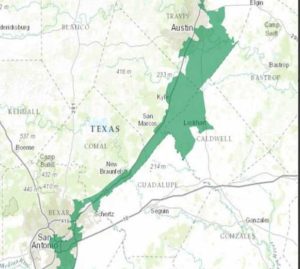Democracy is “quite literally dying in the dark,” warned one commentator.

of Wednesday morning, while much of the country slept, the Republican-dominated Texas House approved a heavily gerrymandered district map that critics have denounced as part of an anti-democratic and racist GOP power grab—one that right-wing lawmakers could try to replicate across the United States.
“Democrats… could soon be powerless to stop the GOP’s takeover of the U.S. House and state capitols for the next decade.”
At around 3:30 am local time, Texas lawmakers passed the GOP’s state House redistricting proposal in a largely party-line vote after roughly 14 hours of debate. The bill, authored by state Rep. Todd Hunter (R-32) and designed to set boundaries for the 150 Texas House districts, now heads to state’s Republican-controlled Senate.
On top of a slew of other right-wing priorities, the Texas legislature is racing to approve state House, state Senate, and congressional district maps before its third special session of the year expires on October 19.
Democracy is “quite literally dying in the dark,” Mother Jones reporter Ari Berman tweeted in response to the Texas House’s passage of its map. Earlier this month, Berman argued that—if fully approved—the Republican-drawn district maps would make Texas’ “political representation far whiter and more Republican, all but ending competition at the very moment when ascendant Democrats are finally making the state competitive.”
Texas Democrats echoed that criticism following Wednesday’s vote. Rep. Chris Turner (D-101) said in a statement that “redistricting should be about drawing fair maps that accurately represent our state’s population, whose tremendous growth was driven almost entirely by minority communities.”
“Instead, we witnessed 16 hours of Texas Republicans denying the importance of protecting minority opportunity districts and cutting up communities of interest,” said Turner. “In their rush to pass their discriminatory map, Texas Republicans have abused the legislative process every step of the way—from the bill drafting to the hearing in committee to tonight’s final debate.”
“Now more than ever, we need the U.S. Senate to pass the John Lewis Voting Rights Act to restore the freedom to vote and ensure all Texans and all voters across the country are given the fair representation they deserve,” Turner added.
As the Texas Tribune reported Wednesday, “For the first time in decades, Texas lawmakers are allowed to draw and enact political maps without first getting federal approval.”
“That preclearance requirement, for states like Texas with a history of discriminating against voters of color in redistricting, was ended in 2013 by the U.S. Supreme Court,” the Tribune noted, referring to the Shelby ruling. “In an attempt to address the absence of that requirement, state Rep. Toni Rose, a Dallas Democrat who serves as vice chair of the House Redistricting Committee, offered an amendment that would have required a federal district court to sign off on the map before it could take effect. The change, Rose said, would have ensured ‘that Texas is following the rules.’ It failed.”[content id=”79272”]
“These maps do nothing but preserve the status quo at the expense of Black and brown Texans.”
After Texas Republicans unveiled their redistricting proposals earlier this month, Common Cause Texas executive director Anthony Gutierrez said in a statement that “these maps do nothing but preserve the status quo at the expense of Black and brown Texans.”
The Texas gerrymandering effort comes as state legislatures across the country—many of which are totally dominated by Republicans—are working to redraw congressional district lines for the next 10 years, an arcane but deeply consequential process that could impact the entire country. The Intercept‘s Ryan Grim warned back in April that “Republicans are poised to gerrymander their way back to the majority” in the U.S. Congress “if Democrats stand aside and let them.”
In March, the Democratic-controlled House of Representatives passed the For the People Act, a sweeping voting rights bill that would ban the kind of gerrymandering that Republicans are attempting to carry out in states nationwide. But the Republican minority has blocked the bill in the Senate—and Democrats have thus far refused to change or eliminate the 60-vote filibuster rule in order to pass the legislation.
A compromise version of the For the People Act—the recently introduced Freedom to Vote Act—would also ban extreme partisan gerrymandering, but the bill has yet to receive a vote in the House or the Senate.
Berman noted earlier this month that the “same strategy” Texas Republicans are deploying to secure their grip on power could soon be used as a model by other key GOP-led states—unless Democrats act immediately.
“Republicans need just five seats to take back the House and could accomplish this through gerrymandering in Texas, Georgia, Florida, and North Carolina,” Berman wrote. “Democrats are running out of time to pass [the Freedom to Vote Act] or devise a strategy for overcoming a GOP filibuster—and could soon be powerless to stop the GOP’s takeover of the U.S. House and state capitols for the next decade.”
Common Dream’s work is licensed under a Creative Commons Attribution-Share Alike 3.0 License. Feel free to republish and share widely.
[content id=”79272″]






